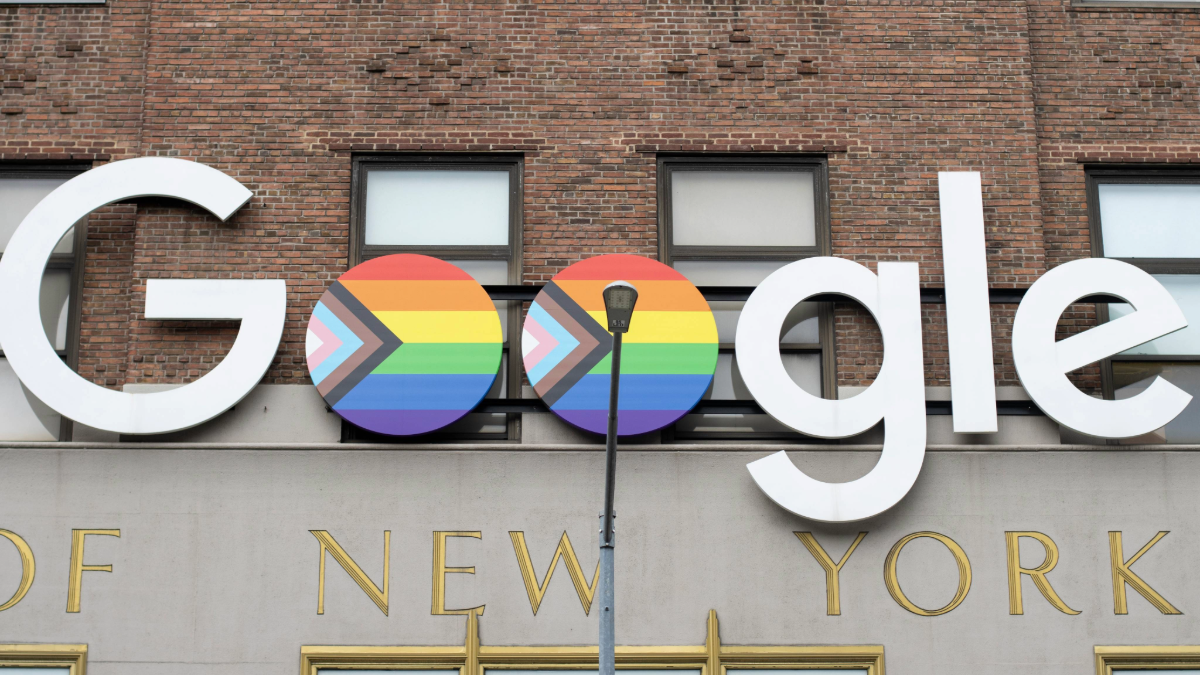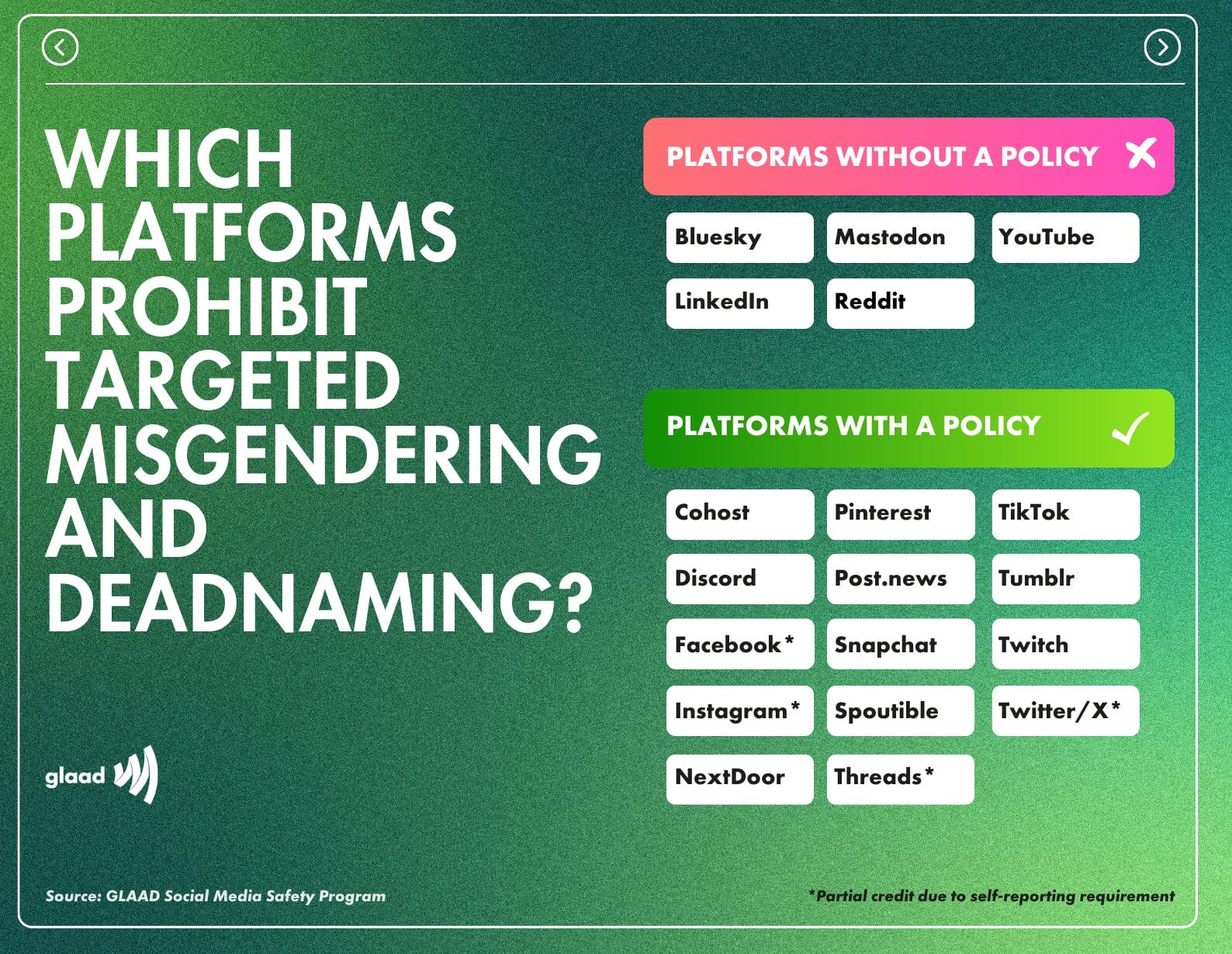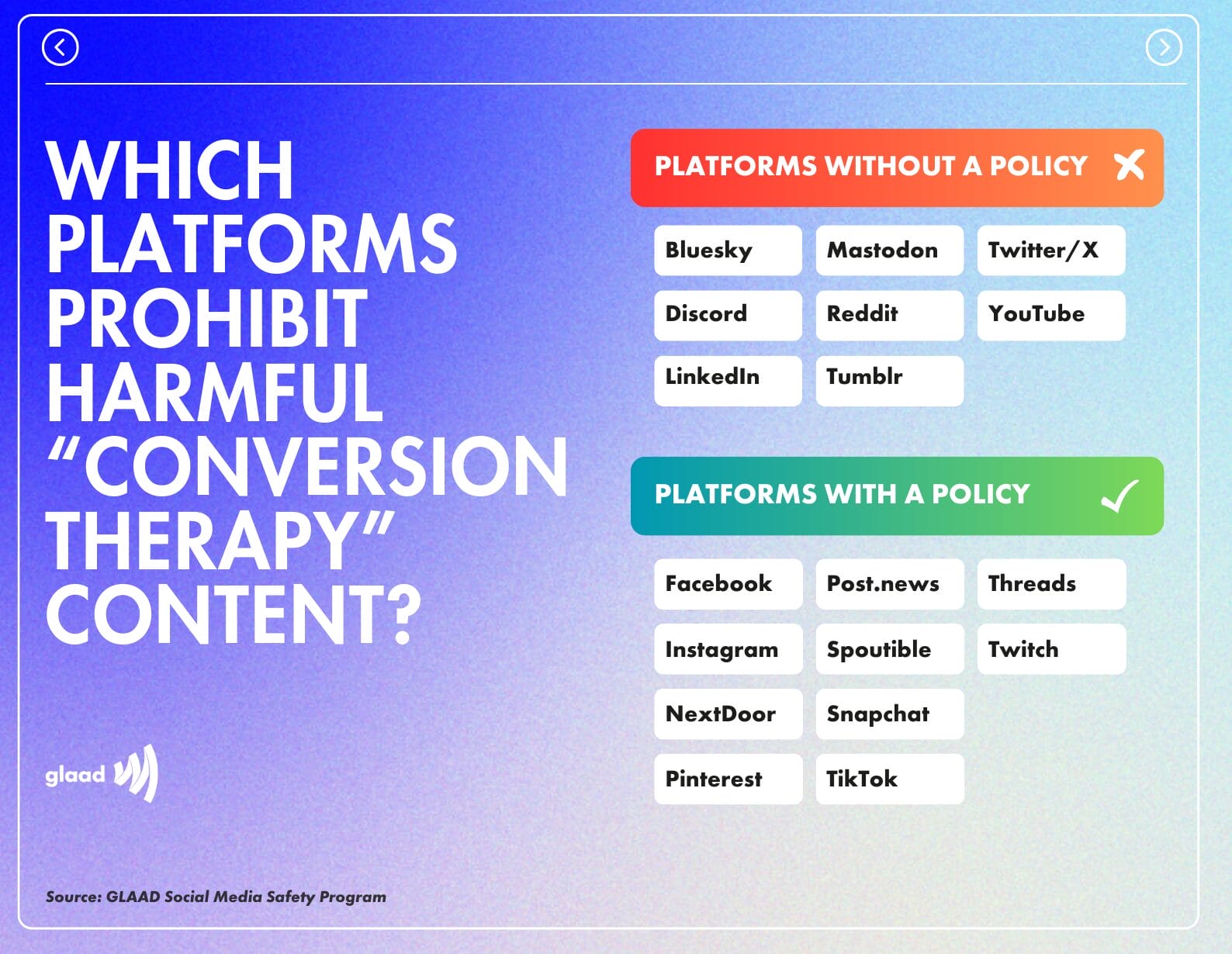Basic LGBTQ Safeguards Missing On Social Media Platforms, New GLAAD Reports Find
Gabby Miller / Mar 1, 2024
Google signage transformed for LGBTQ Pride at its New York City office, July 7, 2022. Shutterstock.
Many major social media platforms are failing to clamp down on certain types of anti-LGBTQ hate speech and targeted harassment, according to a pair of new reports from GLAAD. The non-profit LGBTQ advocacy organization tracked a slew of platforms’ policies around targeted misgendering and deadnaming as well as so-called “conversion therapy” content, with mixed results. While some findings indicate that tech companies are beginning to take these harms seriously and implement explicit policies addressing or mitigating this kind of user or advertiser content on their platforms, others are failing to implement even the most basic LGBTQ safety protections.
In the first of two reports, GLAAD highlights how right-wing figures have obsessively bullied, mocked, and harassed prominent transgender people online as a way to boost their own engagement and traffic while promoting general anti-trans sentiment. Some of these tactics include “targeted deadnaming and misgendering.” Deadnaming is when a person refers to someone by their “birth name” rather than their “chosen name,” whereas misgendering is when someone uses pronouns for another person that don’t align with their gender identity. Platform policies around deadnaming and misgendering specifically refer to "targeted" and "intentional," rather than accidental or unintentional. "This isn’t about accidentally getting someone’s pronouns wrong or mistakenly mentioning their old name," the GLAAD report explains. "This is hate speech pure and simple, designed to evade existing hate speech policies in multiple ways including exploiting policy loopholes like Meta’s public figures policy."

GLAAD infographic displaying platforms' policies on targeted misgendering and deadnaming.
Prominent examples of hate-driven campaigns against public trans figures include TikTok influencer Dylan Mulvaney, who has been relentlessly targeted by conservatives over her collaboration with Bud Light, including by Fox News hosts Jesse Waters and Greg Gutfeld, as well as actor Elliot Page, who was the subject of a 15-minute diatribe by right-wing ideologue Jordan Peterson, in which he misgendered and deadnamed Page dozens of times. Peterson’s 2022 video, which was posted on YouTube and viewed more than 3.5 million times, was demonetized – but not removed – for violating YouTube’s advertising policies against hateful and derogatory content, according to GLAAD.
A Google Civil Rights Audit published the following year advised Google to review its YouTube policies, writing that the platform “has the potential to create an unsafe environment for users and real-world harm” in the absence of an outright ban on intentional misgendering or deadnaming of users – something a coalition of advocacy and accountability groups have for years called for. At the time of publication, YouTube still has no policy explicitly prohibiting this behavior, and is joined by LinkedIn, Reddit, Mastodon, and Bluesky. And as a result of billionaire owner Elon Musk’s systematic dismantling of platform safeguards, X did away completely with its policy against targeted misgendering and deadnaming in April 2023. A modified version has since quietly been re-introduced, and as of January 2024, its harassment policy has a new clause on “Use of Prior Names and Pronouns" that mitigates violative content.
TikTok is the only major platform that explicitly bans targeted misgendering and deadnaming in its hate and harassment policy, of the six tracked in the report. Meta, which operates Facebook, Instagram, and Threads, has a policy that “can be interpreted to cover” these forms of anti-LGBTQ harassment but only when the attacks are self-reported by the user. Nor does Meta’s policy apply to public figures, a loophole GLAAD recommends Meta close, as it leaves “transgender notables unprotected and allows anti-trans hate accounts to target them as a way of expressing general anti-trans animus.”
The complementary report GLAAD published is about platforms’ policies, or lack thereof, for harmful “conversion therapy” content. So-called “conversion therapy” is a practice that falsely claims an LGBTQ person’s sexual orientation, gender identity, or gender expression can be changed. It has also been condemned and widely debunked by major medical, psychiatric, and psychological organizations, including the American Medical Association and American Psychological Association. And although conversion therapy has been banned in 14 countries as well as twenty two US states and Washington, DC, “disinformation, extremist scare-tactic narratives, and the profit-driven promotion of such services continues to be widespread on social media platforms, via both organic content and advertising,” according to the GLAAD report.

GLAAD infographic displaying platforms' policies on "conversion therapy" content.
Major social media platforms Meta and TikTok both have explicit policies banning content promoting conversion therapy, although Meta’s requires additional information or context to enforce. YouTube, while without an explicit prohibition policy, at least mitigates “conversion therapy” content by showing a Trevor Project info-panel debunking the practice when AI detects its presence on the video platform.
The good news is that more tech companies are actively taking up policies that outright ban content promoting or advertising “conversion therapy” as well as targeted deadnaming and misgendering. Social platforms Post and Spoutible both added explicit bans against “conversion therapy content” into their policies within the last few months. And in January, SnapChat explicitly banned both anti-LGBTQ practices after consultations with GLAAD.
Correction 3/1/24: Our original report stated that X did not have a policy against targeted deadnaming and misgendering at the time of publication. We updated it to reflect that a modified version of their original policy, which was removed in April 2023, was re-introduced in January 2024.
Authors
